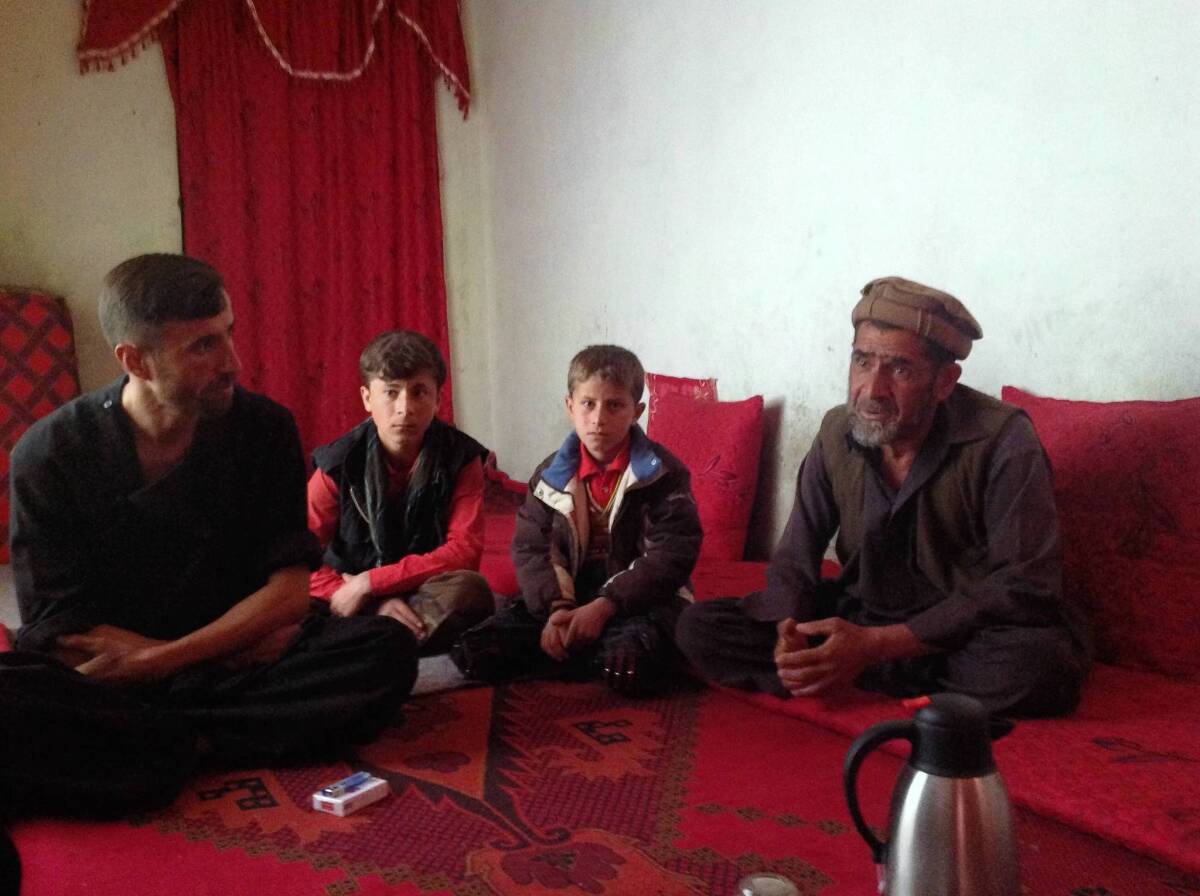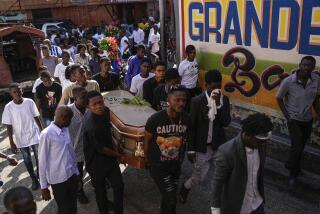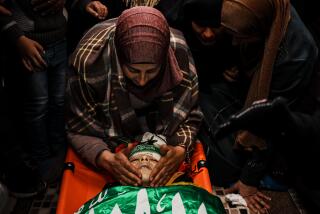An Afghan farmer tills under his dreams for his son

- Share via
NAQI KHAIL, Afghanistan — The minivan taxi crossed a river, then jostled and bumped on an unpaved road. The border policeman sat with the ordinary passengers; his buddy lay in a coffin fastened to the roof, “Praised be God for Zabiulla” written on the wood.
The others got off at a bus station, and the taxi, the policeman and the coffin continued along the main road in northeastern Afghanistan’s Kapisa province. In each village they stopped at, nobody knew the dead man.
It was 4 p.m. when the taxi pulled up next to the Naqi Khail primary school and a store with a rusty metal machine that churned out vanilla soft-serve ice cream.
The border policeman asked shopkeepers whether the dead man’s family was from the area. All he had was a name. Zabiulla Agha.
***
A quarter of a mile away, Jan Agha was gathering wheat in his fields. One of his children had just filled a wheelbarrow with the crop and headed toward home. The next day, his 19-year-old son, Zabiulla, who had been away four months serving with the Afghan border police, was going to be married.
At 17, Zabiulla had left home to earn money working in construction in Iran so he could start a family. While he was there, his father called him with the news that he had arranged for Zabiulla to marry his first cousin. She was a year younger than he and they had known each other since childhood. On trips home from Iran, Zabiulla would spend time at her house.
But no matter how hard he worked, he saved nothing, so a little more than a year ago, the boy returned to his village. If Jan had been able, he would have hired his son as a farmer, but wheat was selling for nothing in the market and they were barely surviving.
Zabiulla looked to the example of his older brother, Ahmed, who served in the army. Ahmed was seriously wounded in 2011 by a suicide bomber who had stolen into a meeting with civilians and the army. It was two months before he could stand with crutches, after which he returned to work.
Jan, 65, hadn’t wanted his oldest son to go, but he could tell him nothing. The army and police were the only way to make a living. Jan, too, had served in the military as a young man, before returning home to cultivate his land.
After four months at home, Zabiulla announced that he was joining the police.
“We can go hungry, but we don’t want to lose you,” Jan remembered telling his boy, trying to talk him out of it, but Zabiulla didn’t listen. He needed $12,000 to pay for a wedding party.
So Jan watched his son go.
***
Two village children appeared on the edge of Jan’s field and shouted for him to come home; someone was there with news about Zabiulla.
Jan walked back to his house and opened the metal gate to the family courtyard. A man introduced himself as a driver from Zabiulla’s unit. Next to him was the coffin.
Jan had seen such coffins on top of cars. They carried the young men killed fighting the Taliban. He understood there was a war. In Kapisa, some districts were controlled by the Taliban, and people often feared the police, not sure even in their own district whether they were agents for the Taliban or criminals who might terrorize them after sunset.
Jan asked villagers standing nearby to lift the coffin’s lid.
His son’s body was burned and torn apart by shrapnel; guts splayed from his stomach. About $1,800 lay in a bag next to the body — government compensation — and Jan grabbed the money. He told the villagers to close the lid, so the women would not see how his son looked.
He listened to the driver. Zabiulla had been in a Humvee along the Pakistani border when the vehicle struck an antitank mine that killed all five men inside.
The driver had flown by helicopter with the coffin to the military hospital in Kabul, the capital, and then been ordered to take the body by taxi to find the family’s village.
Jan felt a stab of anger at the Afghan leaders in Kabul. Why hadn’t they sent Zabiulla home in an ambulance? How could they just put his boy on the top of a taxi van? They cared nothing for people like him.
He watched his wife cry and his young boys become cold like him. Only two days before, he had phoned Zabiulla and told him to come home. They were planning his marriage for midweek. He had arranged their yard for the party: dancing and a meal of meat and rice for 500 men. It would be the same for the women.
The night before what was to have been his son’s wedding, he was burying him.
It was dark as Jan traveled by car to the grave. Headlights illuminated the cemetery as the body, shrouded in white, was lowered into the ground in front of 100 men.
***
In the shade of berry trees, cows grazed and hens clucked. Jan wore his blue work clothes and gray cap, his face unshaven.
Nearly 40 days after Zabiulla’s death, Jan’s 12-year-old son greeted guests like a weathered old man, shaking hands somberly. Even his grandchild copied him, staring blank-faced and cupping his palms in grief the way his grandfather did.
Jan found himself lost in bitterness toward the government. He wondered why no commanders or officials had come to Zabiulla’s funeral. Down the road, a police colonel had died of a heart attack, not even in combat, and the government paid for the funeral; commanders drove up and paid their respects.
Even worse, his son’s salary had been stolen, not a trace of it found with the body. A relative with connections to the border police forced an investigation and a border policeman called Jan to apologize, saying he was sick and needed the money to pay for a doctor. The policeman swore he would repay them.
It seemed to Jan that when he served in the army years before, the government had taken care of its men. Not now.
While he farmed, he remembered his son, the way Zabiulla helped him till their fields with a cow-pulled plow. He glanced at his two boys and could only hope for the best: to get them married, and settle them in his house. But he knew he couldn’t guarantee their future. For now, they would farm with him and grieve with him, but tomorrow they could break his heart.
His head sagged and his brown eyes looked swollen. He spoke of his wish for his late son, the same dream he had for all his children: “I wanted for him to have a better job, a better future, to have a family and to be with me.”
Special correspondent Hasmat Baktash contributed to this report.
More to Read
Sign up for Essential California
The most important California stories and recommendations in your inbox every morning.
You may occasionally receive promotional content from the Los Angeles Times.










